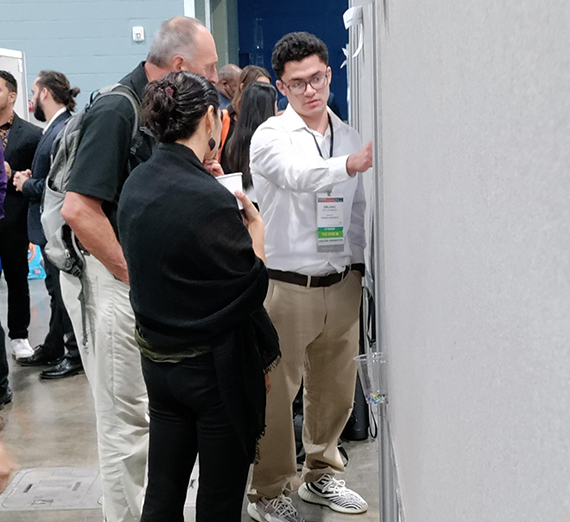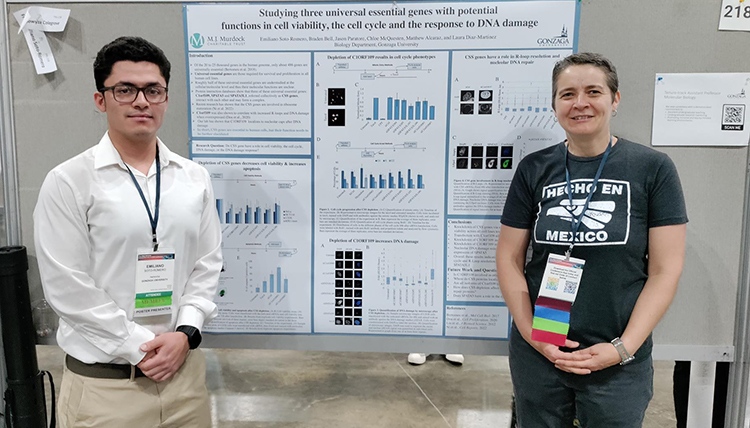GU Biology Student Explores Diversity in STEM Conference

Sometimes a work trip to a conference is just that — work, and little else. But sometimes a work trip can be a transformative experience. It can be something that inspires a person at the beginning of their career journey to explore something new, and a person already established in their field to find new energy and excitement in their work.
Senior biology student Emiliano Soto-Romero (‘23) and Assistant Professor of Biology Laura Diaz-Martinez both attended this fall’s National Diversity in STEM Conference (NDiSTEM) in Puerto Rico, presenting findings learned in their lab work at Gonzaga. Both praised the conference and the sense of belonging they felt, and Soto-Romero's experience has him rethinking his post-graduation plan to continue working in research.
His experience at the conference opened Soto-Romero's eyes to the possibility of completing a postbaccalaureate program after graduation instead of going straight into the workforce as he originally intended. He still plans on continuing his education, but is unsure of whether he wants to enter a graduate program or medical school.


At the conference, Soto-Romero presented the lab results from his time in Diaz-Martinez’s lab examining the functions of three selected genes important to human life that the researchers believe are working together. The preliminary results suggest that some of these genes might be involved in how cells respond to lesions in their DNA. This is an important discovery because the DNA in our cells is constantly being damaged, either by environmental factors like UV rays or internal factors like chemical reactions in the cells themselves. Being able to repair the damage happening to the DNA is an important function in order for cells to continue to survive and function properly.
“Just getting to see that was inspiring because if they can do it, I can also do it.”
It was both of their first times attending the NDiSTEM Conference, the largest multidisciplinary and multicultural STEM diversity event in the country. The conference features STEM research presentations, professional development sessions, motivational keynote speakers, the Graduate School & Career Expo Hall and multicultural celebrations and traditions.
Diaz-Martinez presented on the recent innovations she has been implementing in her classes and Advanced Biology lab as part of the science education aspect of the conference.
“One of the most energizing things for me was that it was probably 75 percent people from marginalized communities,” Diaz-Martinez said. “It was just very empowering to be in a place where you see that it is possible that there is a force of scientists from a diversity of communities that already exist, and we can definitely make science more diverse if we want to.”
Soto-Romero received a full travel scholarship from the Society for Advancement of Chicanos/Hispanics and Native Americans in Science (SACNAS) covering all expenses relating to his time at the conference. He’s the president of GU’s SACNAS chapter, and attended a pre-conference retreat for chapter leaders to share their challenges and successes.
“The overall experience of the conference was really good,” Soto-Romero said. “I got to meet a lot of graduate students and professors and there was this large exhibition booth with more than 100 colleges, so I got to talk to at least 10 of them.”
Soto-Romero presented a poster of his lab findings at the conference, which he said was difficult for him because it required examining the viewer’s understanding of the material before he was able to offer further explanation.
“I got a lot of new feedback," Soto-Romero said.
Soto-Romero has worked in Diaz-Martinez’s cell biology lab since fall of 2020.
“It’s been a good experience because graduate and medical schools are looking for that. This research in particular, biology and human genes, is very focused on what I want to do in the future,” Soto-Romero said. “This is one of the most important experiences I’ve had at Gonzaga, if not the most important.”
The research presented at the conference was titled “Exploring the Functions of C1ORF109, SPATA5, & SPATA5L1, Three Understudied Universal Essential Human Genes, in Cell Viability and the Cell Cycle.” Other GU students who contributed to the research along with Soto-Romero are Braden Bell (‘23), Jason Paratore (‘22), Chloe McQuesten (‘23) and Matthew Alcaraz (’23).
